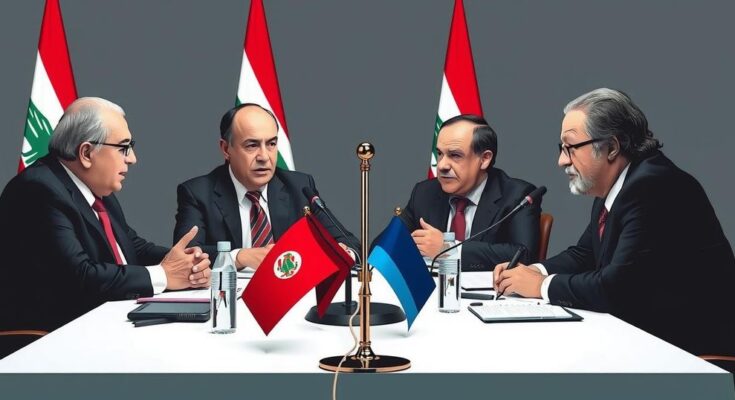Lebanese leaders held discussions on the eve of a critical parliamentary session to elect a president, with General Joseph Aoun emerging as a leading candidate. Despite pressures from international entities urging consensus, divisions among factions complicate the election process, leaving Lebanon without a president for over two years as it grapples with severe economic challenges.
Prominent Lebanese leaders convened on Wednesday, just prior to a parliamentary session aimed at electing a new president. Despite Hezbollah’s recent military setbacks, there remains uncertainty regarding a consensus candidate. Lebanon has faced a severe economic and political crisis and has lacked a president since October 2022, with tensions between Shiite group Hezbollah and rival factions stalling progress.
General Joseph Aoun, currently serving as the army chief, is regarded as the leading contender, with supporters suggesting he is suited to manage military operations in southern Lebanon. Under a ceasefire agreement with Israel, Hezbollah is to withdraw its fighters from the border region, permitting the national army to deploy there. However, various factions remain hesitant to endorse the army chief in this thirteenth effort to appoint a new leader.
Internationally, there is increased pressure on Lebanese politicians to choose a president. French envoy Jean-Yves Le Drian has been actively facilitating discussions, meeting with key political figures and emphasizing the critical nature of electing a new leader. United States envoy Amos Hochstein similarly urged politicians to capitalize on the existing truce to form a political consensus.
Joseph Aoun has garnered support from the United States, as well as notably from France and Saudi Arabia. The latter has reached out to local political factions, advocating for a unified backing of Aoun amidst ongoing discussions for reform actions necessary to address the country’s financial predicament, which has worsened since 2019.
Although caretaker Prime Minister Najib Mikati expressed optimism regarding the likelihood of electing a president, internal divisions remain pronounced. The president must be a Maronite Christian and typically requires the backing of at least one major Christian party. The Lebanese Forces party is expected to announce their support for a singular candidate while other political factions continue deliberating their positions.
Political observers note that Hezbollah’s ability to influence the elections has diminished following significant losses in recent military engagements. Nevertheless, the threat of oppositional candidates remains as Lebanon looks to move forward from a legacy of political fragmentation and foreign interference.
The political situation in Lebanon has been fraught with instability, characterized by a prolonged presidential vacancy that has persisted for over two years. This absence has arisen within the context of bitter divisions primarily between Hezbollah, a Shiite militia, and various opposition groups. The country’s complex political landscape is further complicated by external influences, including pressure from international powers like the United States and France, highlighting the necessity for a leader capable of instigating vital reforms following a severe economic crisis that has persisted since 2019. Additionally, Lebanon’s governance is shaped by a power-sharing system, mandating that the president must be a Maronite Christian, which has further constrained the political options available to the ruling factions. Given the ongoing geopolitical tensions in the region, particularly involving Israel, any new presidential appointment could significantly impact Lebanon’s stability and security trajectory. The overarching aim remains to establish a government that can restore faith in national institutions and effectively address economic challenges facing the nation.
In summary, Lebanon’s political leaders are engaged in crucial discussions aimed at electing a president amid rising instability and external pressures. General Joseph Aoun appears to be the primary candidate, yet consensus remains elusive due to deep-rooted divisions and hesitations from various political factions. The outcome of this electoral session will not only influence Lebanon’s immediate political landscape but also its capacity for economic recovery in the long run.
Original Source: www.barrons.com




